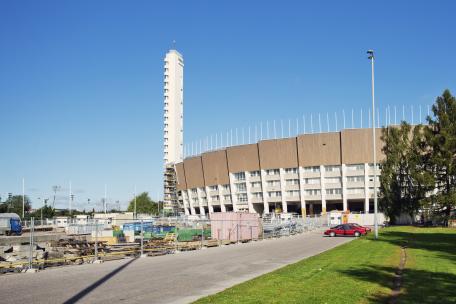City
Adaptation and preparedness for extreme weather events
Helsinki’s operational preparedness is at a good level, but adaptation and preparedness require changes in land use planning and construction and decisions on the level of preparedness.
Read more about adaptation and preparedness for extreme weather events ›
Meeting binding targets
The City met a higher proportion of its binding targets than before. 64 per cent of the binding operational targets and 74 per cent of their indicators in the 2024 budget were met.
Read more about the meeting of binding targets ›
Data breach in the Education Division
The Education Division’s data breach revealed weaknesses in the City’s data security controls, data security maintenance responsibilities and data retention practices. The data breach highlighted the need to clarify the City’s data security management.
Read more about the data breach in the Education Division ›
The City’s finances
In 2024, expenditure growth exceeded the target set in the strategy. In the previous few years, the target was met. The loan portfolio has decreased, but gross liabilities have increased as a result of loan guarantees issued to Group entities in particular.
Read more about the City's finances ›
Implementation of productivity-enhancing reforms
City divisions and enterprises had started the planning and implementation of productivity-enhancing reforms in line with the City Strategy for 2021–2025. The Urban Environment Division and Helsinki City Construction Services Stara had systematically implemented measures in accordance with the productivity-enhancing action plan and achieved desired impacts.
Read more about the implementation of productivity-enhancing reforms ›
Promotion of Helen Ltd’s environmental objectives
Helen has, for the most part, promoted the Helsinki City Group's environmental objectives, but the ecological sustainability of the biomass that it burns requires further attention. Helen is investing in the promotion of small-scale nuclear power.
Read more about the promotion of Helen Ltd's environmental objectives ›
Coordination of roadworks and reduction of their negative impacts
The City has taken measures to reduce the negative impacts of roadworks, but these efforts should be continued in the future as well. For now, legislation does not support efforts to reduce the negative impacts of roadworks.
Read more about the coordination of roadworks and reduction of their negative impacts ›
The City’s business services, cooperation with higher education institutions and investment attraction
The City’s rapid growth rate has caused challenges for companies with larger space needs, as the increasingly dense structure has resulted in a lack of space. Cooperation between the City and higher education institutions has been active.
Read more about the City’s business services, cooperation with higher education institutions and investment attraction ›
The effectiveness of recommendations
Measures have been taken on 96% of the recommendations presented in the 2022 assessment report.
Read more about the effectiveness of the recommendations of the 2022 assessment report ›
2024ManagementCityEducation DivisionHelsinki City Transport (HKL)Social Services, Health Care and Rescue Services DivisionCity Executive OfficeUrban Environment DivisionCulture and Leisure DivisionService CentreRescue DepartmentConstruction Services (Stara)Financial Management HelsinkiOccupational Health Helsinki
Meeting binding targets
Fifty-eight per cent of the binding operational targets in the 2023 budget and 60% of their indicators were met.
Read more about the achievement of binding targets ›
Targets set for the Group
Ownership strategies set objectives for the subsidiaries. However, assessing whether the objectives have been met is difficult because they are set so vaguely.
Read more about the objectives set for the Group ›
The city’s finances
2023 was the first year in which the expenditure and income of social services, health care and rescue services are no longer part of the city’s self-financed budget. Key figures show that the restructuring had little impact on the City of Helsinki’s financial situation.
Read more about the city’s finances ›
Attractiveness of libraries and promoting reading
Visitors have found their way back to libraries in 2023 following the coronavirus pandemic, as the number of library visits has increased compared to 2020–2022. Library visits by primary school pupils are extensive, but lower secondary and secondary school pupils and students visit less.
Read more about the attractiveness of libraries and promoting literacy ›
The progress of urban renewal
Urban renewal is only just beginning, and so far relatively minor measures have been taken in the areas. However, efforts have been made to promote the objectives of urban renewal.
Read more about the progress of urban renewal ›
Winter maintenance of pedestrian and bicycle paths
The city has not been able to increase the proportion of people satisfied with winter cycling. Measures to improve winter conditions on pedestrian paths are only just beginning. Taking winter maintenance into account in land-use planning solutions would allow for more effective snow management.
Read more about the winter maintenance of pedestrian and bicycle paths ›
City advocacy from an economic perspective
The city’s national advocacy has developed with the mayor model over the last two strategic periods.
Read more about the city’s advocacy ›
The effectiveness of recommendations
Action has been taken on 94% of the recommendations from the 2021 assessment report.
Read more about the effectiveness of the recommendations of the 2021 assessment ›
The implementation of Sarastia, the human resources and payroll system
The introduction of Sarastia, the human resources and payroll system, failed in several areas. There were shortcomings in management, operational models, competence and system performance. Not enough effort was put into deployment and, in particular, into change management.
Read more about Sarastia’s implementation ›
The effectiveness of recommendations
Action has been taken on 90% of the recommendations from the 2020 assessment report.
Read more about the effectiveness of the 2020 assessment report’s recommendations ›
Safety in the city’s various areas
The number of crimes committed by young people has remained relatively stable in recent years. However, serious criminal offences against persons committed by young people are on the rise. On the other hand, there has been a marked decline in police alerts for disorderly behaviour and vandalism.
Read more about safety in the city’s various areas ›
Achievement of binding targets
Forty-two per cent of the binding operational targets were met. Fifty-eight per cent of the indicators measuring target achievement were met. The coronavirus pandemic still affected meeting targets, especially in the Culture and Leisure Division.
Read more about the achievement of binding targets in 2022. ›
Effectiveness of recommendations
The recommendations the Audit Committee issued in 2019 usually led to measures.
Read more about the effectiveness of the recommendations of the 2019 assessment report. ›
Achievement of binding objectives
51 per cent of the binding operation objectives were achieved. The prolongation of the COVID-19 pandemic has impacted the achievement of the objectives of the Education Division and the Social Services and Health Care Division in particular.
Read more about the achievement of the 2021 binding objectives ›
Effectiveness of the recommendations
Most of the recommendations issued by the Audit Committee in 2018 led to actions.
Read more about the realisation of the recommendations ›
Achievement of binding objectives and targets
56 per cent of the binding operational objectives and targets were achieved. The binding operational objectives and targets were best achieved in the Central Administration and the Urban Environment Division.
Read more about the achievement of binding operational objectives and targets ›
Achievement of the binding objectives and targets
The City divisions that were the most successful in achieving their binding operational objectives and targets were the Education Division and Central Administration.
Read more about Achievement of the binding objectives and targets
›
Effectiveness of the recommendations
The recommendations issued by the Audit Committee in 2017 led to measures except the fact that the dual role of elected representatives and office holders who belong to the Helsinki Group’s administration continues to be problematic.
Read more about Effectiveness of the recommendations
›
Direction provided to the City divisions by the City Executive Office, mayor and deputy mayors
With the introduction of the new management system and City division model, the controllability of the City organisation has improved. However, control and direction have become more fragmented, and there is a lack of clarity regarding who directs what.
Read more about assessment of the new management system ›
Quality of digital services
The quality of the City of Helsinki’s digital services is good for the most part when compared to the national quality criteria for digital services. However, there is room for development in the findability and functionality of the services.
Read more about Quality of digital services
›





















